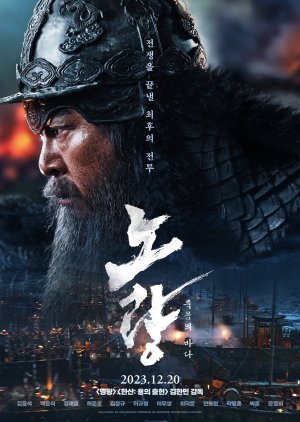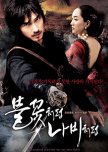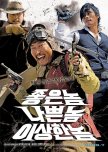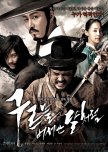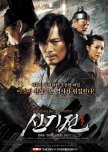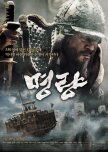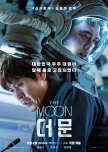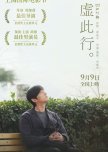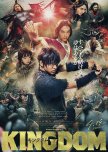Deze recentie kan spoilers bevatten
Will we ever see an Imjin War movie that respects history?
Noryang: Deadly Sea depicted its namesake, the Battle of Noryang, which was the last major battle of the Imjin War, one where Ming/Joseon forces pursued a fleeing enemy, the Japanese invaders under Taiko Toyotomi Hideyoshi. Realizing the war was shifting rapidly against Japanese interests and with domestic unrest brewing, Toyotomi had made arrangements for an orderly retreat even while he was still alive. The sudden death of the Taiko however, meant whatever plans he had in motion went haywire. An opportunity where Ming/Joseon forces were all too happy to exploit.For the most part, the production values were excellent. Although it was obvious the actors were standing in front of a green screen on numerous occasions, the special effects team strived to render battle scenes and large fleet maneuvers as realistic as possible, something even Hollywood would be hard-pressed to replicate. In terms of costumes, I was particularly impressed with the costumes of all parties involved, which provided distinctiveness and displayed careful research. I was especially impressed by the movie's depiction of Ming armor, which was the most accurate yet in a Korean production, and even Chinese media companies could learn a thing or two from.
The uneven acting and abuse of artistic license unfortunately, was where this movie faltered. Japanese characters were either tyrannical villains or sniveling cowards, lacking any humanizing quality. Chinese characters were no better, as they were portrayed as arrogant buffoons with one sole exception. Then, once these 'foreign' characters started to speak, whatever seriousness this movie managed to muster at that point instantly fell apart. Chinese and Japanese characters (played by Korean actors) spoke in what should be their native tongue, but uttered their lines with great irregularity accompanied by the occasional over-the-top performance. This was obvious as most of them probably had no idea what they were saying. Japanese characters conversed with notable disconnected syllables, thick accents, pause in the wrong areas and overall seemed as if they were just reciting their scripts verbatim. The Chinese characters were even worse as their 'Chinese' was difficult to comprehend and became complete gibberish when delivered at a faster pace. The lack of understanding in how Chinese terminology should be applied also contributed to numerous instances of unintentional hilarity. For example, Chen Lin addressed Yi Sun-Sin as 'Lao Ye', roughly meaning old-master or lord-master depending on context. Except this would never happen since Chen Lin was actually older than Yi Sun-Sin, and also the latter's superior officer. Yi for his part, would never consider breaking protocol and suggest parting ways as that would have amounted to treason. Moreover, the relationship of the two men were known to be amicable, thus it was unfortunate that this movie chose to fabricate their mutual intense-friction for the sake of drama. To further signify Yi's skills in naval strategy, Chen also had to be made a moron, which led to the death of another key character, that of Deng Zilong. In reality, the latter met his demise by friendly fire while fighting onboard Admiral Yi's own flagship in midst of enemy formation. It was actually Yi's ship that was surrounded, and Deng was killed in action alongside Yi. But we cannot have Admiral Yi's reputation tarnished now, can we?
Furthermore, the plot was inconsistent. The movie informed us early on that Japanese forces were seeking to retreat and sought safe-passage in their negotiations with the Chinese since all parties involved at that point realized the Japanese could no longer maintain a presence on the Korean peninsula. Though near the end, somehow the battle became one of desperation for Ming/Joseon, and the Japanese fleet seemed as if it was more than capable of committing another serious naval campaign. Whatever the original objectives of the Japanese forces (one of retreat) were lost at that point.
With all the modern media revolving around the topic of the Imjin War produced by South Korea, there seems to be an implication that South Koreans believe Joseon Korea could actually win the entire war by themselves. This implication can be both blatant and subtle, depending on the production, but difficult to miss. In order to reinforce this notion, very often Joseon's Chinese allies were made feeble while their Japanese foes degraded to near cartoonish levels of villainy all for the purpose of portraying Joseon's efforts during the Imjin War to be more significant than it actually was. Especially when Admiral Yi is involved, and this movie is no different. While the production values were marvelous, excessive artistic license to prop up Joseon efforts marred by obvious language barriers in this movie reached a point where certain segments ranged anywhere from cringe to downright laughable. No one is disputing Admiral Yi's prowess as a naval strategist and leader of men, and stories focused on him should not require the degradation of everyone else around him. It is entirely possible to highlight his qualities while staying true to historical sources. It is not difficult.
Vond je deze recentie nuttig?

Korean cinematic phenomenon
Extravaganza cinematic visionary that is more extraordinary than ever, this could very well be the most monumental achievement ever done in a war film. The naval battle sequence lasted for an overwhelming 100 minutes in hyper realistic visuals and intense actions that are totally out of this world. The well arranged narrative is also mind-boggling enough to maximize the tension of the political struggle alongside some really insane acting performances, everything is simply too phenomenal in this movie.Vond je deze recentie nuttig?

KOREAN ARROGANCE AT ITS BEST
The only valuable thing ( rarely achieved in Korea cultural thief dramas) is the representation of the Ming armor, mostly accurate that the news was even spread on Chinese medias.But it's the really the 1 only thing valuable.
Historical inaccuracy both in historical fact and depiction of the reality. Japanese are depicted as cowards, and Chinese are greedy and arrogant. I should mention even the problem in speaking in Japanese and Chinese ( a student can speak way better). "Lao Ye" in a non-confidential relationship is unbearable to listen, and the depiction of a modified relationship from mutual respect to contrast is too stupid.
The big problem is that the depiction is like Korean army pretend to be able to defeat Japanese army on their own, in a showing act of supreme arrogance while it was them to ask for help to the Great Ming Empire, their sangguk, their master and owner.
The whole drama diminishes and degrades Yi Sun's sacrifice because Korea is too arrogant in their own depiction.
A show completely to miss, because it only show arrogance.
But don't be surprised, don't you know Korea created the whole world, as they themselves are convinced?
Vond je deze recentie nuttig?

